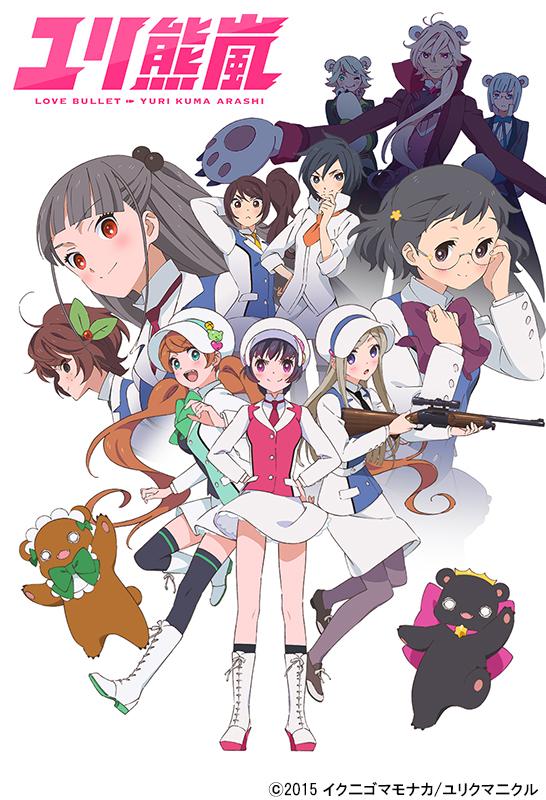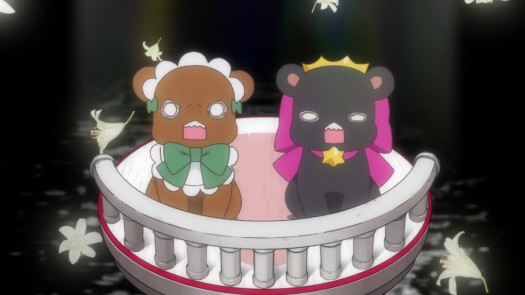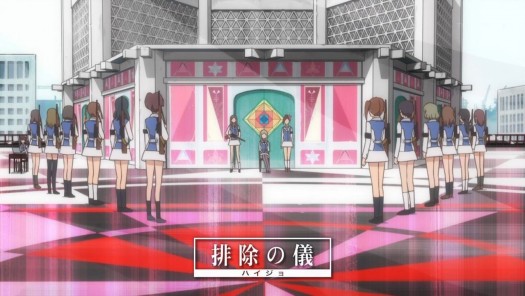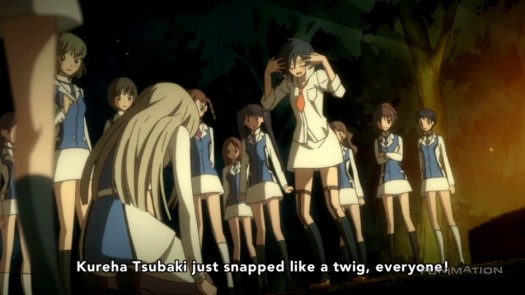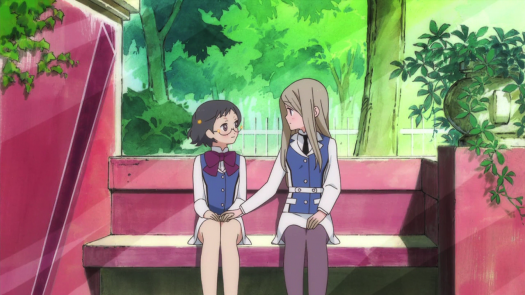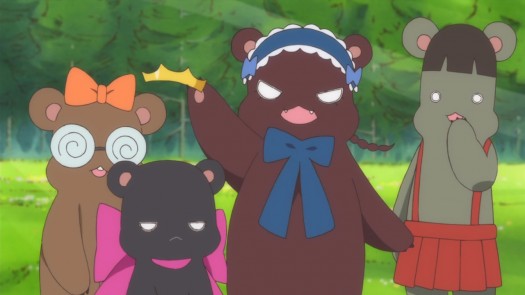Kuma Shock: Why I Was Wrong About "Yurikuma Arashi"
Three months ago I wrote a scathing review of Kunihiko Ikuhara's newest anime series Yurikuma Arashi, declaring that he had lost his mind and that his work with showcasing strong stories dealing with those in the LGBT community had been stomped on viciously thanks to the series' disturbing fan-service and nonsensical plotline. I had watched the first three episodes of the anime, and declared myself done with it. Or so I thought.
**WARNING: This article may contain spoilers**
A couple months later I came across convention attendees, members of the press, and even friends who began to scold me over my hatred of Yurikuma Arashi. They went into further detail about how it deals with Japan's mindset when it comes to those in the gay and lesbian community, and that it showcased a great moral on treating all with equality. When I told them I didn't get any of that in a show about "lesbian bears" they asked how far along I got with the series. Upon my three episode answer, they looked at me with surprise and responded, "You stopped watching at the worst possible time!"
This is one exclamation I've heard especially in the gaming realm. "It gets better after the first 100 hours," they'd say about Final Fantasy XIII; "The plotline goes along quicker 20 hours in," I overheard about Dragon Age: Inquisition; or "You didn't drop the cash for any of that sweet DLC," one guy told me in regards to just about every Call of Duty game I ever bought. But in regards to anime, if you give a show enough of a chance and you can't get into it, then it just must've not been your cup of tea. Never have I ever gotten terrible looks of disappointment the way I did when I revealed my hatred towards Yurikuma Arashi, a response that I had received unanimously from every single living being I revealed this to.
And so, after weeks of fighting the urge and attempting to keep supporting my rating of a 3.5 out of 10 in my original review, I finally caved in and watched the rest of the series. It only took just the fourth episode of Yurikuma Arashi to show how much I misjudged it. It's not an easy thing to type, but when you are wrong about a series you have to own up to it and admit your mistakes.
First let's get this out of the way: a show about humans versus bears sounds incredibly silly, and in many ways it is. Watching Lulu and Ginko in their bear form, even in the most dire of moments, left me chuckling, with lines like "Gao gao, delicious smell!" making me burst out laughing. In fact if someone told me this was the premise for a series I would expect it to be more along the lines of a cartoon like Squidbillies or Aqua Teen Hunger Force, as it had that [adult swim] vibe all over it. However that's not what was delivered here, and I should be thankful for that.
I mentioned the fourth episode above, where the plotline is a flashback to when Lulu was a princess and how she found herself over the Wall of Severance with Ginko. This was where the writing got better, showcasing a whole lot of that character development and subtext that the first three episodes lacked. Episode Five, where the two bears find themselves now squatting in Kureha's house, is where the plot became more understandable, with more mysteries becoming uncovered that drew me into the show. How Ginko is connected to Kureha, the mystery behind Kureha's mother's death in the jaws of a bear, and the treatment of Kureha by the rest of her classmates were written in a way that made it almost impossible to stop watching.
It's where you saw Kureha's classmates treat her like an outcast when Yurikuma Arashi began unraveling its sleeves and revealing its emotional scars. That painful feeling of being cast aside by your peers and the rest of society is an incredibly scary thing to witness, whether it's from your own personal experience or from the eyes of someone else's. When you watch Kureha's classmates set fire to the flowerbed -- on her birthday, of all days -- it pulls on your heartstrings in a way that makes you realize how cold and cruel of a world these characters live in. The same can be said in a later episode when a bunch of Kureha's classmates bully her, leaving her covered in bruises both physically and mentally.
What makes this imagery stick with you more is that instances like this happen in real life all the time. If someone is different from the norm, whether they're gay, disabled, or even something like being of another faith or ethnicity, the first response by a good chunk of the population is to not deal with them at all. Pretend they don't exist, don't invite them to your get-togethers, and if they attempt to be a part of the festivities you simply push them to the ground and force them to turn around and isolate themselves. It's a disgusting mentality that appears throughout the globe, and while we've made a lot of progress in the last couple decades there are still many areas that are in need of improvement.
Yes, some of the strong lesbian undertones in the first three episodes can be very unsettling, like having to watch the infamous sex scene in Blue Is The Warmest Colour on repeat with the rest of your family sitting alongside you. What I didn't realize at the time is that the feeling you get when seeing these images is exactly how Ikuhara wants you to feel. It's so in-your-face, in the same way that religious and political pundits claim that the so-called (and very, very not real) gay agenda is doing to the general public. But all that imagery stops appearing, with only a couple shots here and there showing up throughout the rest of the series, and instead you start getting what the anime is really about.
The rest of Yurikuma Arashi puts its focus on being a story about love and equality, and while you may need to do a bit of research here and there to get some of the symbolism the moral of what the show is trying to teach becomes very clear as the series progresses. It can still get a little uncomfortable at times, but having to fight for love and acceptance will introduce you to these moments that -- in a way -- makes you stronger for battle. Even someone with Autism like myself has faced similar moments like Kureha, dealing with people who wish to make you a target and a plaything for their own agenda (from classroom bullies to even organizations like Autism Speaks that demonize the very people they claim to help). But like Kureha I kept acting strong, and when the times were tough I had my own Lulu and Ginko to turn to when I needed an extra boost of confidence. Yurikuma Arashi may be focused primarily on LGBT acceptance, but what it teaches throughout the anime can be put to just about any person out there trying to find equal ground within a "normal" society.
In the original review I had also pointed out recycled animated sequences in the first three episodes, which is something of a trademark of Ikuhara that can be found especially in Revolutionary Girl Utena. Well as it turns out those "recycled scenes" only appear in those three episodes, with only the CGI shot of a bear claw making a swipe attack the only repeated piece of animated footage to be found throughout the rest of the series. The same can be said about those graphic "girl-on-girl" transformation sequences, which also stopped after episode three. Yurikuma Arashi is gorgeous, and perhaps one of the most artistically detailed series of the year.
So why did I give such a low grade to this series to begin with, and why would I write about a series I had only seen three episodes before giving a final thought? After all I usually wait for at least six episodes before I write an anime review, so why did I reveal my initial reaction at half that episode count? While I can't remember the exact reason there might've been time restraints and the feeling of having to have an article up by a certain date that might've factored into it. Getting an article up in a rush can lead to bad insights and wrong interpretations to seep through, which is exactly what happened with Yurikuma Arashi. I gave an unfair opinion of this series, and for that I have to make things right.
In the end Yurikuma Arashi is a far better series than I initially gave it credit to. While some of its elements keep it from being the masterpiece both Sailor Moon S and Revolutionary Girl Utena were, along with the concept of humans against bears still sounding pretty silly, what you learn from this show overshadows the flaws it has. Ikuhara's storytelling talents were more clever the more you dive into the series, and the characters became either more likable or detestable, depending on the situations that were thrown in the series. Yurikuma Arashi got a whole lot better the deeper you dove, but in order to truly appreciate what's being taught you'll have to first swim through some incredibly rough waters. Once you do, you'll discover what I did: a great series about love, acceptance, and the trials & tribulations of what one has to do to earn both.
Yuri approved, shaba-da-doo.
OFFICIAL FINAL GRADE: 8.5 (out of ten)
Yurikuma Arashi can be viewed on FUNimation.com and Hulu, along with Crunchyroll in Europe (excluding the UK, Ireland, and Scandinavia).


